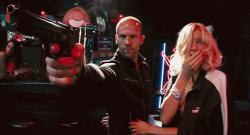In which Japan's premier stylist of sex and blood hits audiences with what may be his most demented film to date. A Fudoh-like tale of a young yakuza with designs on taking over the whole damn family, Ichi the Killer plumbs depths that Takashi Miike's punishing masterpiece Audition merely skirted.
The film is named after a blubbering hit man with a dark childhood secret and a rape fetish. Ichi (Nao Omori) is in thrall to a hypnotist who makes him believe that various yakuza enemies are the bullies who tormented him as a schoolboy. Among his targets are Kakihara (Tadanobu Asano), a masochist and body-modification enthusiast whose boss (and dominator) is found dead at the beginning of the film, precipitating a near gang war as Kakihara tries to pin the crime on a rival boss whom he tortures severely. (Tetsuo director Shinya Tsukamoto plays Jijii, a disgraced cop who became a hit man after his gun was stolen from him.)
For a time, Ichi the Killer rivals Peter Jackson's Braindead in terms of the sheer volume of clever violence on display. The gore is overwhelming; Ichi has blades on his shoes that allow him to cleave a man in two, or take a killing slice out of a woman's neck, with one neat whip of his leg. Most definitely not for general audiences, Miike's film models itself on fantastic comic-book violence and revels in the grossout. Too bad he doesn't have enough ideas to fill out the film's 129-minute running time. Much of Ichi the Killer feels repetitive or simply indifferent, rather than gleeful, confrontational, completely fucked up—or, most delightfully, a combination of the above.
Still, Ichi the Killer is something of a marvel, swerving from black horror-show humor into wildly disturbing tableaux of psychological trauma and sexual brutality. One absurdly funny sequence has Kakihara audition a new lover in a torture dungeon. Later, the same woman tries to engage in erotic role-playing with Ichi himself, but the game goes abruptly sour when Ichi takes her exhortations to rape alarmingly seriously. Miike makes it clear that it remains OK to laugh at the audacity he shows in staging such stuff—he doesn't turn into Michael Haneke or anything—but at the same time he forces an involuntary, protohuman reaction to the taboo material that he puts on screen. Dark places indeed.

















Leave a comment